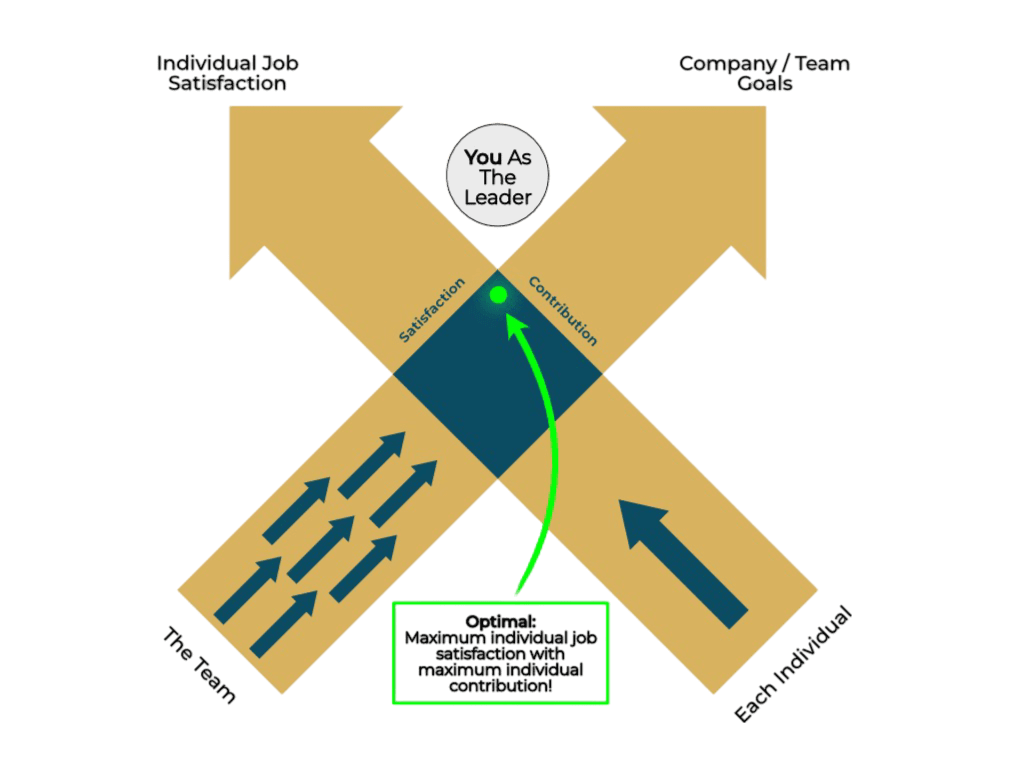Achieving peak performance is about creating an environment where each individual feels empowered, fulfilled, and motivated to contribute to their fullest potential. When you maximise individual job satisfaction, you enhance team contribution, building an achievement culture where each individual and the organisation thrive.

8 Ways To Maximise Contribution and Satisfaction
1. Align Individual Strengths with Organisational Goals
A key factor in maximising contribution is ensuring that each person’s strengths and skills are aligned with the company’s goals. This begins by understanding not just the skill set an individual brings, but also their passions and long-term career aspirations.
Actionable Steps:
- Conduct regular one-on-ones: Have open discussions about career goals, challenges, and how team members envision their future within the company.
- Tailored roles: Where possible, tailor roles or projects that align individual strengths with organisational needs, creating win-win scenarios.
- Skill development opportunities: Offer training that aligns with both the company’s strategic objectives and individual career paths.
2. Encourage Open Communication and Feedback
Communication is the lifeblood of any successful team. Open, transparent, and consistent communication ensures that team members feel heard and understood, which increases engagement and job satisfaction.
Actionable Steps:
- Create a feedback culture: Encourage upward, downward, and peer feedback. Constructive criticism, when delivered well, leads to continuous improvement and higher morale.
- Hold regular team meetings: Keep everyone on the same page by creating spaces where team members can share ideas, successes, and challenges.
- Encourage idea sharing: Build an environment where everyone feels safe to share ideas, even if they’re unconventional. This promotes innovation and a sense of ownership.
3. Empower Autonomy and Ownership
Micromanagement can stifle creativity and reduce job satisfaction. On the other hand, giving team members autonomy not only boosts their confidence but also leads to greater innovation and initiative.
Actionable Steps:
- Delegate meaningful tasks: Instead of simply assigning tasks, delegate responsibility. Empower team members to make decisions, offering guidance rather than rigid instructions.
- Clear roles, flexible methods: Set clear expectations and goals, but allow flexibility in how team members achieve them.
- Celebrate ownership: Recognise when individuals take the initiative or solve a problem independently, reinforcing a culture of accountability and pride.
4. Recognise and Reward Contributions
Recognition is one of the most powerful motivators. When people feel appreciated, they’re more likely to stay engaged and committed. Recognition also builds a positive team culture, where success is shared, and contributions are valued.
Actionable Steps:
- Offer personalised recognition: Tailor recognition to the individual. Some may appreciate public praise, while others prefer a private conversation or written note.
- Celebrate team wins: Acknowledge not just individual achievements but also team milestones. This builds a sense of collective success.
- Monetary and non-monetary rewards: While bonuses and monetary remuneration are important, small gestures like an extra day off, or tickets to an event, can be equally motivating.
5. Invest in Work-Life Balance and Wellbeing
Happy, healthy employees are productive employees. Prioritising well-being not only maximises job satisfaction but also reduces burnout and turnover, creating a more sustainable work environment.
Actionable Steps:
- Encourage time off: Promote the use of leave and avoid a culture where long hours are seen as the norm. Well-rested employees are more creative and productive.
- Flexible working arrangements: Where possible, offer flexibility in working hours or remote work options to help team members balance their personal and professional lives.
- Health and wellness programs: Provide access to wellness initiatives, whether it’s through a gym membership, mental health resources, or mindfulness workshops.
6. Encorage Collaboration and Shared Purpose
When individuals feel that they’re working toward a shared goal, the team becomes more cohesive, and individual contributions feel more meaningful. This sense of purpose drives both job satisfaction and higher performance.
Actionable Steps:
- Set clear, shared goals: Ensure that everyone understands the broader mission of the company and how their role contributes to it.
- Cross-functional projects: Encourage collaboration across departments or teams. This creates a more inclusive environment and exposes individuals to new perspectives.
- Culture of trust: Build trust among team members by promoting transparency and ensuring that everyone feels supported.
7. Provide Growth and Development Opportunities
Stagnation is a surefire way to lower engagement and satisfaction. People need to feel that they are growing in their roles, both personally and professionally, to stay motivated and committed to the organisation.
Actionable Steps:
- Continuous learning: Offer professional development opportunities, whether through workshops, courses, or conferences.
- Clear career progression paths: Map out potential career paths within the organisation so that team members understand how they can grow and what’s required to move forward.
- Mentorship and coaching programs: Pair less experienced employees with mentors who can guide them, offering both professional advice and support. Provide executive coaching for your leadership teams.
8. Nurture a Positive Culture
The culture of an organisation significantly impacts job satisfaction. A culture that promotes inclusivity, respect, and collaboration will naturally encourage higher levels of contribution.
Actionable Steps:
- Define and live your values: Ensure that the company’s core values are more than just words. Embed them into everyday operations, decisions, and interactions.
- Foster inclusivity: Create an environment where diversity of thought and background is not only accepted but celebrated.
- Promote work socialisation: Regular team-building activities, whether formal or informal, help strengthen relationships and foster a sense of belonging.



